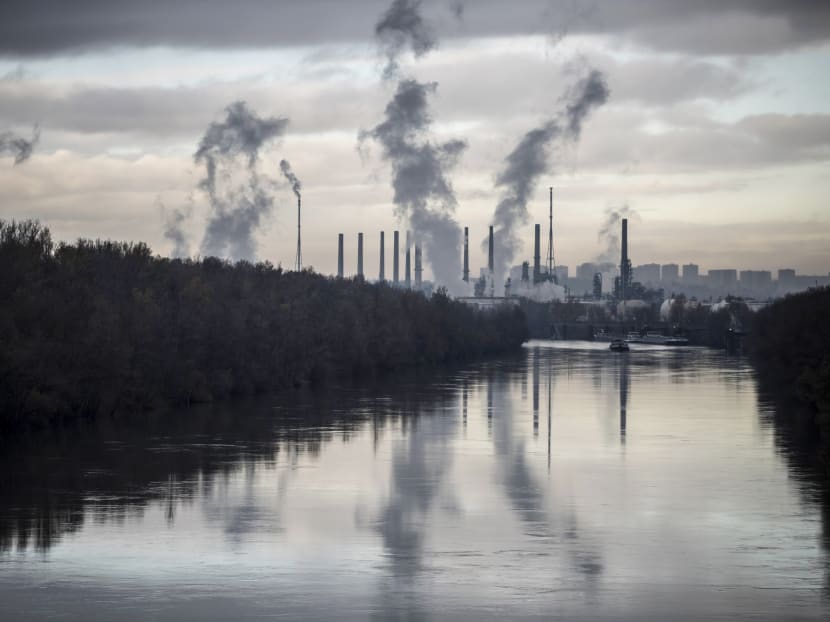Universal cooperation, robust framework ‘key to climate change deal’
SINGAPORE — A durable post-2020 global climate change regime will require participation by all countries acting within a rules-based multilateral framework, said Singapore’s Chief Negotiator for Climate Change.

Smoke belches from an oil refinery, on November 25, 2015 at Feyzin, some 10 kilometers south of Lyon. France will be hosting the COP21, also known as "Paris 2015" UN climate summit, from November 30 to December 11, 2015. Photo: AFP
SINGAPORE — A durable post-2020 global climate change regime will require participation by all countries acting within a rules-based multilateral framework, said Singapore’s Chief Negotiator for Climate Change.
In an email interview, Ambassador Kwok Fook Seng told TODAY that the ongoing talks in Paris to negotiate an international climate change framework to replace the Kyoto Protocol expiring in 2020 should put in place a robust mechanism for all countries to cooperate.
“No one will have any excuse not to act. This is the only way to succeed, over time, in our goal to limit the temperature rise to as far below 2°C as possible,” he said, referring to how the negotiators have been guided by a goal to stop global temperatures rising more than two degrees Celsius above pre-industrial levels.
The envoy, who is Singapore’s lead official in the climate change negotiations, said that in order to reach a multilateral agreement on this important issue, a balance must be struck between competing interests.
“We must avoid another Copenhagen situation where a perceived lack of transparency and inclusiveness led to a negotiated outcome being unacceptable,” he said, referring to the 2009 climate change summit in the Danish capital where hopes for a new global framework were high but a deal was scuppered by mistrust between countries.
In particular, several large emitters felt that their interests had not been taken into account.
“The only way to succeed (in Paris) is with the buy-in of all countries,” added Mr Kwok, who was Singapore’s former permanent representative to the World Trade Organization in Geneva.
After the Copenhagen talks broke down, negotiators have been in discussions for the past six years on a blueprint for the new agreement.
The backbone of the new framework is a hybrid system of pledges made by individual countries to cut emissions as well as negotiated broad principles to ensure transparency and avoid free-riding.
The pledges will be subject to a measurement, reporting and verification system which is legally binding.
“This is ultimately the mechanism which will lead to universal cooperation to lower global emissions,” said Mr Kwok in the interview.
With more than 170 signatories under the United Nations Framework Convention on Climate Change having put forth their post-2020 Intended Nationally Determined Contributions (INDCs) — including major emitters such as the United States, China, India and the European Union, negotiators are confident that an agreement can be reached this time round.
Officials are meeting this week and the next to negotiate the broad principles currently contained in a 54-page draft agreement before the ministers and leaders meet from Dec 7 to 11 to finalise the deal. Foreign Minister Vivian Balakrishnan as well as Environment and Water Resources Minister Masagos Zulkifli will lead the Singapore delegation.
Several outstanding issues remain on the table, including differentiation — how countries are divided in the United Nations Framework Convention on Climate Change as Annex One developed countries and Non-Annex One developing countries, with the former expected to take on greater responsibilities — as well as how to finance mitigation and adaptation actions for the developing countries.
In the lead up to the Paris conference, Singapore has pledged to reduce emissions per gross domestic product dollar — also known as emissions intensity, by 36 per cent by 2030 from the levels in 2005.
Asked how Singapore’s INDC has been received by the international community, Mr Kwok said there is broad recognition among the negotiating parties that it is up to each country to nationally determine its pledge for climate actions based on its national circumstances and its domestic context.
“Parties have largely refrained from passing judgment on each other’s pledges, but to focus on improving the collective effort. The large number of Intended Nationally Determined Contributions tabled has helped move the process in this direction,” he said.
Mr Kwok said that Singapore intends to achieve its INDC fully through domestic efforts, adding that the country’s pledge must be viewed in the context of its small contribution of 0.11 per cent of global greenhouse gas emissions.
“Our mitigation contributions should also be viewed within the context of our limited access to alternative/renewable energy sources and the early action we had taken since independence to ensure that our economic growth was not at the expense of the environment,” he said, pointing out that Singapore has switched early from oil to natural gas for electricity generation to promote sustainable development.
Clarification: An earlier version of this story said Singapore has pledged to reduce carbon dioxide per gross domestic product dollar by 36 per cent by 2030 from the levels in 2005. This is inaccurate. Singapore has pledged to reduce emissions per gross domestic product dollar by 36 per cent by 2030 from the levels in 2005.






